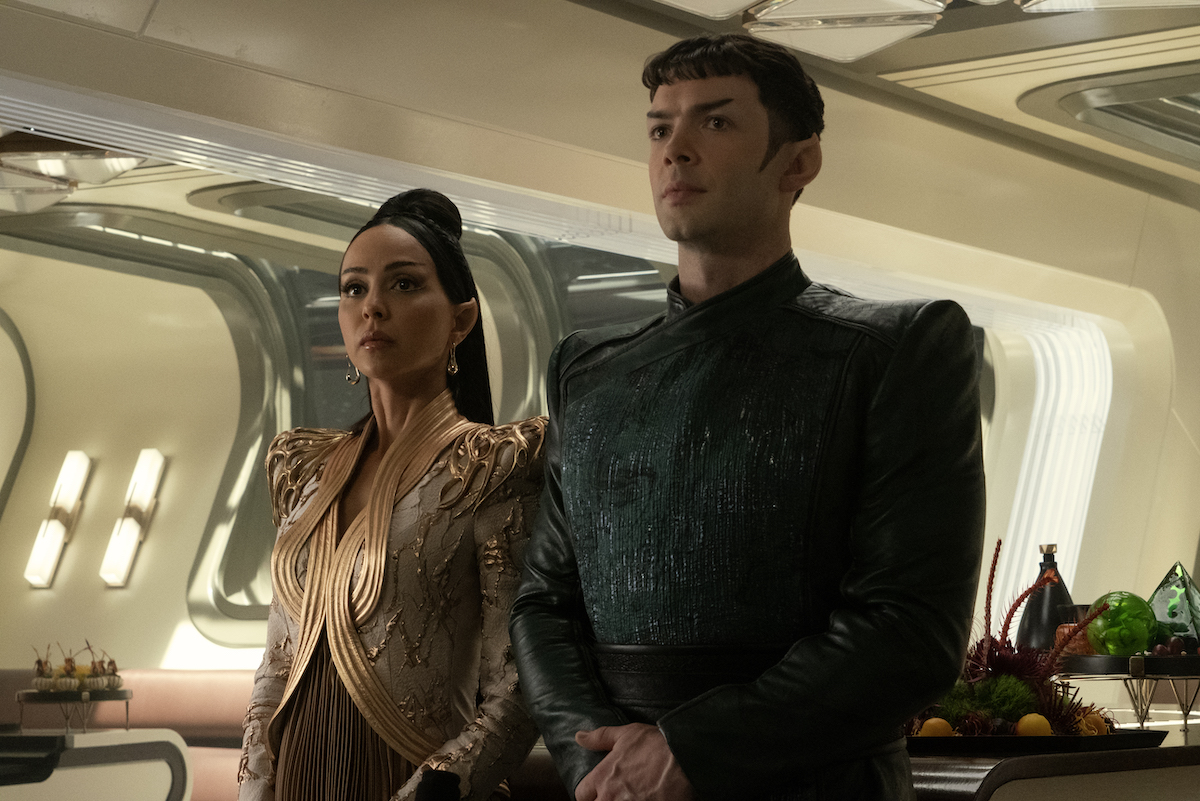I Have Complicated Feelings About Spock and Neurodivergence in ‘Charades’

The latest episode of Star Trek: Strange New Worlds, “Charades,” dives into a trope that Star Trek loves to explore: what if one person were split in half?
In this case, Spock’s (Ethan Peck) Vulcan side is stripped away when interdimensional aliens try to heal him after a shuttle accident. The aliens botch the job, thinking that his Vulcan genome is an anomaly, and Spock is left fully human. His predicament couldn’t come at a worse time: Spock’s future in-laws are visiting for an engagement ceremony, and every ritual surrounding the ceremonial dinner has to go exactly right. Chapel (Jess Bush) eventually convinces the aliens to help her find a cure, but not before Spock is forced to grapple with a new onslaught of human emotions, and the trials of faking his Vulcan-ness for T’Pring’s judgmental mother.
“Charades” is the height of Star Trek kookiness, and overall, it works. The episode is a fun, lighthearted look at Spock, which allows Ethan Peck to show off his comedic talents. However, like any Star Trek story, “Charades” also poses some thoughtful questions. Trekcore points out that the episode is a powerful story about immigrant families and multiracial identity. Personally, I was reminded of how Spock has long been a relatable character for neurodivergent viewers.
A quick note: I know Spock isn’t literally neurodivergent in the episode. However, many viewers with autism and other forms of neurodivergence identify with him, given his different way of feeling and expressing emotions, his inquisitive demeanor, and his struggles to fit in with all the non-Vulcans around him.
What makes “Charades” so interesting is that it would have been very easy for the other characters to agree that the human Spock was better. Wow, he’s “normal” now! He gets our jokes! He enjoys our food! What an improvement!
But in the end, the episode didn’t go there. Instead, when Chapel, Uhura, and Ortegas travel back to interdimensional space to talk to the aliens, Chapel makes it clear that it’s Spock in his entirety that she has feelings for. Not the new Spock. Not the one who, she admits, seems to understand her feelings more. She loves Spock for who he is.
Of course, the episode has its flaws. At one point, when his crewmates are coaching him in how to act more Vulcan for T’Pring’s parents, La’an tells him his usual voice is more “robotic.” I cringed when I heard that line, since “robotic” is an insult that many autistic people have had to endure. The line was especially complicated coming from La’an, since her trauma has affected her own personality, making her one of the show’s more guarded characters.
Still, I appreciated the episode’s approach to neurodivergence. Instead of Data’s eternal quest to become more human in Star Trek: The Next Generation, Spock’s loss of his Vulcan side shows that what makes someone lovable isn’t how well they mimic the personalities of everyone around them. Instead, it’s their uniqueness and their differences. Now that I think about it, it’s a lesson T’Pring’s mother would do well to learn.
(featured image: Michael Gibson/Paramount+)
Have a tip we should know? tips@themarysue.com
